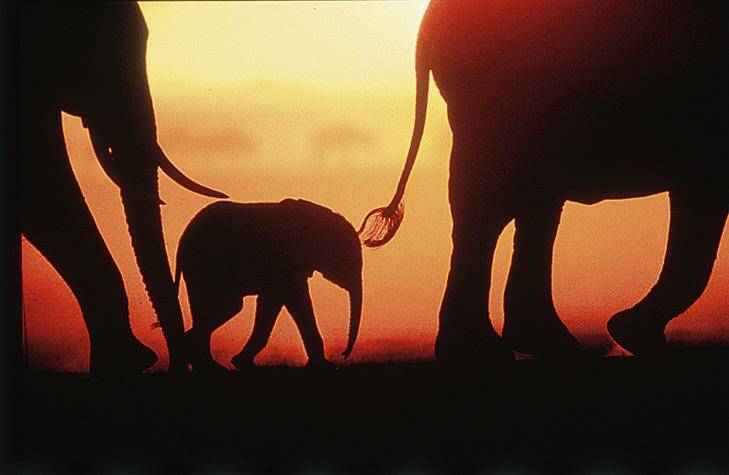Do elephants forget? Not too easily, it seems, when there's a high level of stress involved. New research has shown it may take up to seven years for African elephants to recover from the trauma of being captured, tranquilised and transported to new territory.
Subscribe now for unlimited access.
$0/
(min cost $0)
or signup to continue reading
A team led by David Jachowski from the University of Missouri detected high levels of chronic stress in elephants relocated to three South African nature reserves. In some cases, these had occurred more than 10 years ago, and elephants were still exhibiting stressed behaviour in their responses to the not-so-new environments. The study, published online in the global science journal PLoS ONE, has interesting implications for the future design of nature reserves in Africa, and also raises questions for ecotourism ventures in nature reserves.

''Our findings suggest that those considering reintroducing elephants need to plan for long-term or chronic stress responses to reintroduction that can last up to seven years and can have cascading effects on elephant behaviour,'' Dr Jachowski told The Canberra Times last week.
Among those chronic stress responses are aggression towards humans, deaths of elephant calves, restless and continual movements of family groups, altered habitat preferences and a tendency to stay within a restricted area of the reserve instead of roaming freely. The study has also raised further questions about whether restricted foraging might also be related to ''nutritional stress and overall diet quality''.
Studying interactions between the biological, behavioral, chemical, physical and social interactions of a species and its habitat is an emerging field of environmental science known as ''biocomplexity''. A recent example has been a study in South Africa's Kruger National Park of links between the loss of mature trees in the African landscape to the frequency of savanna fires and debarking of trees by elephants.
Dr Jachowski's research into chronic stress levels caused by translocation also flags the possibility that altered use of habitat by elephants is likely to have a long-term impact on vegetation and soils. Loss of species, weed proliferation, soil compaction and erosion could be among potential impacts. The three reserves used for the study were Phinda private game reserve, iSimangaliso Wetla park and Pilanesberg National Park. In iSimangaliso, the research team found chronically stressed elephants were using 43 per cent less of the nature reserve than elephants in the smaller Phinda reserve. They also found the elephants in iSimangaliso ''selected exotic forest plantations over native habitat''.
The PLoS ONE paper is co-authoured by Dr Jachowski, and two South African scientists - Rob Slotow and Joshua Millspaugh - from the University of KwaZulu in Natal. It argues that studies of how wildlife use ''refuges'' is critical to gaining an understanding of how quickly animals will adapt to a new environment. The term ''refuge behaviour'' is used by ecologists to refer to observations of how wildlife responds - both physically and psychologically - to habitat limitations. That can include adjusting to urban sprawl, land clearing or translocation.
''In South Africa, where elephants are being reintroduced to relatively small fenced reserves, there is a particular need to consider the potential for refuge behaviour. Elephants have been translocated for reintroduction into more than 58 reserves in South Africa. The process of translocation is well established and designed to be as unobtrusive to the animals as possible, but still results in elevated physiological stress responses for up to 30 days post-release,'' Dr Jachowski says.
He argues that the study's findings suggest reserves need to be designed to minimise stress on translocated elephants.
''These refugia likely need to be areas of limited human disturbance. Further, examples from the parks we surveyed suggest that elephants exhibiting such long-term refuge behaviour tend to be more aggressive towards humans. Thus, limiting human access to elephant refugia is likely in the interest of both the elephants and humans,'' he says.
''The history of human deaths caused by elephants in the reserves included in this study - while anecdotal - suggests that chronic stress and refuge behaviour might be linked to incidences of elephant aggression.''
Does the study also have implications for zoos and ecotourism safaris?
''There is evidence that elephants that have been habituated to humans likely don't exhibit long-term stress responses following translocation … Therefore, I am hesitant to expand our findings to captive zoo elephants,'' Dr Jachowski says.
As for eco-tourism, the study did conclude that chronic stress following translocation of elephants was ''at least loosely linked'' to elephant aggression towards humans. One solution might be to create ''wilderness zones'' off-limits to humans to minimise potential for elephant aggression and give elephants the space to recover from stress.
■ Rosslyn Beeby is science and environment reporter

